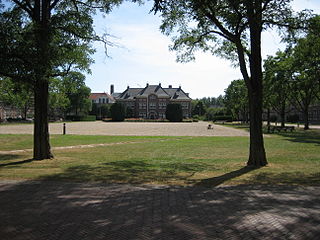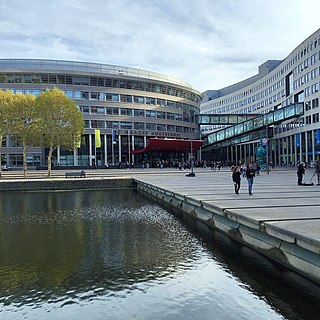
A master's degree is a postgraduate academic degree awarded by universities or colleges upon completion of a course of study demonstrating mastery or a high-order overview of a specific field of study or area of professional practice. A master's degree normally requires previous study at the bachelor's level, either as a separate degree or as part of an integrated course. Within the area studied, master's graduates are expected to possess advanced knowledge of a specialized body of theoretical and applied topics; high order skills in analysis, critical evaluation, or professional application; and the ability to solve complex problems and think rigorously and independently.

Education in the Netherlands is characterized by division: education is oriented toward the needs and background of the pupil. Education is divided over schools for different age groups, some of which are divided in streams for different educational levels. Schools are furthermore divided in public, special (religious), and general-special (neutral) schools, although there are also a few private schools. The Dutch grading scale runs from 1 to 10 (outstanding).
Maastricht University is a public research university in Maastricht, the Netherlands. Founded in 1976, it is the second youngest of the thirteen Dutch universities.
A graduate diploma is generally a qualification taken after completion of a first degree, although the level of study varies in different countries from being at the same level as the final year of a bachelor's degree to being at a level between a master's degree and a doctorate. In some countries the graduate diploma and postgraduate diploma are synonymous, while in others the postgraduate diploma is a higher qualification.

University College Utrecht (UCU) provides English-language Liberal Arts and Sciences undergraduate education. Founded in 1998, as the first university college in the Netherlands, it is part of Utrecht University. Around 750 students of 70 different nationalities live and study on campus. Students can design their individual curriculum with courses in one of the three departments: Science, Social Sciences and Humanities.
Honours degree has various meanings in the context of different degrees and education systems. Most commonly it refers to a variant of the undergraduate bachelor's degree containing a larger volume of material or a higher standard of study, or both, rather than an "ordinary", "general" or "pass" bachelor's degree. Honours degrees are sometimes indicated by "Hons" after the degree abbreviation, with various punctuation according to local custom, e.g. "BA (Hons)", "B.A., Hons", etc. In Canada, honours degrees may be indicated with an "H" preceding the degree abbreviation, e.g. "HBA" for Honours Bachelor of Arts or Honours Business Administration.
A Master of Philosophy is a postgraduate degree. The name of the degree is most often abbreviated MPhil. MPhil are awarded to postgraduate students after completing at least two years of original research, normally in the form of a thesis or dissertation. In many fields, the completion of a MPhil is typically required for employment as experts, or researcher. MPhil may also serve as a provisional enrolment for a PhD programme.
The School of Law at Trinity College Dublin is the oldest established law school in Ireland. It teaches law to undergraduate and postgraduate students, as well as conducting legal research and holding conferences.

Education in Belgium is regulated and for the most part financed by one of the three communities: Flemish, French and German-speaking. Each community has its own school system, with small differences among them. The federal government plays a very small role: it decides directly the age for mandatory schooling and indirectly the financing of the communities.

University College Maastricht (UCM) is an English language, internationally oriented, liberal arts and sciences college housed in the 15th century Nieuwenhof monastery in Maastricht, Netherlands. Founded in 2002, it is the second of its kind in the Netherlands. The college is part of Maastricht University and offers a selective honours interdisciplinary programme.

Fontys University of Applied Sciences is a Dutch university of applied sciences, located in the southern Netherlands. It has over 44,000 students in several campuses. The three largest Fontys campuses are located in the cities of Eindhoven, Tilburg and Venlo. The name Fontys comes from the Latin word "fons" which means "source". Fontys offers 200 bachelor's and master's study programmes in the fields of economics, technology, health care, social work, sports and teacher training. A selection of these programmes are offered in German and English. Independent Dutch university rankings by Keuzegids place Fontys among the top-ranked large universities of applied sciences in the Netherlands. In 2014, former Fontys Chairperson Nienke Meijer was named the "Most Influential Woman in the Netherlands".

The Hague University of Applied Sciences is a university of applied sciences with its campuses located in The Hague, Delft and Zoetermeer. The main campus in The Hague is located behind The Hague Hollands Spoor railway station by the Laakhaven Canal.
The European Inter-University Association on Society, Science and Technology (ESST) is an association of universities that teach and research together in the field of social, scientific and technological developments. Universities from all over Europe are members of the association, which was founded in 1991 and is registered as a non-profit organisation in Belgium. The association was founded to strengthen education and research in Science and Technology Studies (STS).

UCMSA Universalis is a multicultural and multidisciplinary student association directly affiliated with the University College Maastricht. It is run by UCM students for UCM students and contributes to both academic and social life at UCM. The association is involved in the organisation of debates, poetry readings, open-mic nights, parties, charity fundraisers, student representation, and other events. Following a structure typical of Maastricht University study associations, it is run by a student board. The Universalis student board consists of an Executive board, a Social Board, an Academic Board, and an Independent Body. Board positions are traditionally a semester to two semesters long. Active members of the association are organised as committees that provide services for all students at the college. All new students automatically become members upon enrollment at the college.

Lauder Business School is an English-language business school in Vienna, Austria, operating as a "University of Applied Sciences" in the Austrian education system. Lauder Business School (LBS) was founded in 2003 as a University of Applied Sciences with financial help from Ronald S. Lauder. There are currently app. 400 students enrolled in one undergraduate and two graduate programs.

Maastricht Science Programme is an English language liberal arts and sciences programme founded in 2010. The program is part of Maastricht University in Maastricht, Netherlands, and offers an honors programme.

Jamk University of Applied Sciences is a university of applied sciences in Finland, in the region of Central Finland. Jamk offers a wide variety of degree programmes in both Finnish and English as well as opportunities for open studies that students can complete either online or on campus, depending on the course. Working life-oriented research, development and innovation (RDI) work is one of the basic tasks of Jamk as a University of Applied Sciences.
Maastricht University Campus Venlo is a satellite campus of Maastricht University located in Venlo, approximately 80 km north of Maastricht.

The Lilongwe University of Agriculture and Natural Resources (LUANAR) is a university outside Lilongwe, Malawi. It was formed in 2011 by a merger between Bunda College of Agriculture of the University of Malawi and Natural Resources College (NRC).

University College Freiburg (UCF) is the central institution for international and interdisciplinary teaching at the University of Freiburg. Its main project is hosting the first public English-language Liberal Arts and Sciences program in Germany. UCF students follow a four-year bachelor program consisting of 240 ECTS credits, and graduate with either a Bachelor of Science or a Bachelor of Arts. UCF serves as a lab for innovative teaching approaches and instructional design.












